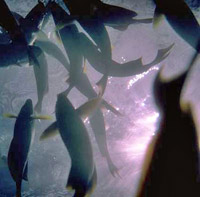
News |
- CEC Calls Again for Improved Standards
- New Regulations Enhance Drinking Water Quality
- British Retail Giants Compete to Go Green
- Activists, Canadian Candidates for 2007 Nobel
- Grand Chief Calls for Tar Sands Moratorium
- Manitoba Pre-Election Survey Sent to Politicians
- NRDC Urges Boreal Lands Protection
- IPCC Report Demolishes Skeptics' Claims
- David Suzuki Tour Hits Winnipeg
- East Side Planning Funds Not Released
- New Fisheries Act Slammed from All Sides
- Kyoto Makes a Comeback - SCC 2007 Report Card
| CEC Calls Again for Improved Standards | 09 March 07 |
 The Clean Environment Commission's (CEC's) February 2007 report marked the third time the provincial government agency has recommended the Manitoba Government take steps to improve environmental assessment standards and practices. The Clean Environment Commission's (CEC's) February 2007 report marked the third time the provincial government agency has recommended the Manitoba Government take steps to improve environmental assessment standards and practices.The CEC first noted the need for improvements to the process by which projects' environmental statements are written and assessed in its September 2004 report on the Wuskwatim Hydro projects. Similar recommendations also appeared in the June 2005 CEC report on the Red River Floodway Expansion. Its February 2007 report on the Pembina Valley Water Cooperative Supplemental Groundwater Supply System again says the system needs improvement. The CEC is recommending the Manitoba Government enact specific environmental assessment legislation (currently the licensing process takes place according to provisions of The Environment Act). It is also calling on the government to provide comprehensive and clear guidance for proponents, consultants and practitioners by issuing Guidelines for projects that are more prescriptive while establishing protocols for best professional practice. To date the Manitoba Government has not taken steps to publicly acknowledge the CEC's recommendations regarding environmental assessment standards, nor has it committed to addressing the recommendations. View the September 2004 CEC Report on Public Hearings - Wuskwatim Generation and Transmission Projects (see Recommendations 7.8 & 7.10, page 127-8) (PDF) View the June 2005 CEC Report on Public Hearing - Red River Floodway Expansion (see Recommendations 4.1 & 4.2, page 118) (PDF) View the February 2007 CEC Report on Public Hearing - Pembina Valley Water Cooperative Supplemental Groundwater Supply System (see Recommendation 8, page 50) (PDF) Source: Clean Environment Commission
|
|
| New Regulations Enhance Drinking Water Quality | 08 March 07 |
 New regulations under the Drinking Water Safety Act that came into effect March 1, 2007 require more stringent standards for drinking water quality in Manitoba. New regulations under the Drinking Water Safety Act that came into effect March 1, 2007 require more stringent standards for drinking water quality in Manitoba.The regulations establish water-quality standards, including bacterial and microbial levels to be met by public and semi-public water systems. Other areas covered by the new regulations include construction and alteration of water-supply facilities, protocols on reporting of laboratory results, and terms and conditions for operating a water-supply system. The new regulations address and define responsibilities for water-system owners and operators and require mandatory testing and record keeping for such water systems. As of March 8, 2007, the new regulations under the Drinking Water Safety Act have not been posted on the Government of Manitoba website. View the March 1, 2007 Government of Manitoba press release View the Drinking Water Safety Act Source: Government of Manitoba
|
|
| British Retail Giants Compete to Go Green | 08 March 07 |
 Two of the UK's largest retailers announced plans to reduce their carbon footprints and provide consumers with environmentally responsible choices. Two of the UK's largest retailers announced plans to reduce their carbon footprints and provide consumers with environmentally responsible choices.On January 15th, 2007 Marks & Spencer (M&S) unveiled "Plan A" and its "eco-plan" which commits the company to meet ambitious goals by 2012. Stuart Rose, M&S Chief Executive said, "M&S will change beyond recognition the way it operates over the next five years. We will become carbon neutral, only offsetting as a last resort; we will ensure that none of our clothing or packaging needs to be thrown away. We will clearly label food we import by air; we will do this without passing on the extra cost to our customers." The same week, Tesco, one of the top five retailers in the world, set out its own 20-point plan to address climate change, notably indicating that it will begin labeling all 70,000 products on its shelves with the amount of carbon generated from the production, transport, and consumption of those items. There are not yet well-established methods for collecting information about a product's carbon footprint. Tesco will invest £5m in academic research on these methods, working with the Environmental Change Institute at Oxford University. Tesco's also promises independently audited absolute reductions in carbon-dioxide emissions from its operations (amounting to a 30% cut per case of product by 2009) and a focus on making green choices available to millions of consumers in an affordable way (e.g. selling low-energy light bulbs at half price). The shifts by the retail giants follow the 2006 release of an influential report by the Sustainable Consumption Roundtable, which concluded sustainable choices need to be much easier to make. View the January 25, 2007 Grist article View the January 15, 2007 Marks & Spencer press release View the January 19, 2007 Financial Times article View the 2006 UK Sustainable Consumption Roundtable report, I Will If You Will - Towards Sustainable Consumption (PDF) Sources: Grist, Marks & Spencer, Financial Times, Sustainable Consumption Roundtable
|
|
| Activists, Canadian Candidates for 2007 Nobel | 05 March 07 |
 Over 180 nominations for the 2007 Nobel Peace Prize have been received, among them prominent activists and environmentalists. Over 180 nominations for the 2007 Nobel Peace Prize have been received, among them prominent activists and environmentalists.Canada's former UN Special Envoy for HIV/AIDS in Africa, Stephen Lewis, is one of the prominent Canadians nominated. Lewis, who held the post from June 2001 to the end of 2006, was named by TIME magazine as one of the "One hundred most influential people in the world" in 2006. Canadian Inuit activist Sheila Watt-Cloutier has been nominated for her efforts to draw world attention to global warming. Watt-Cloutier, is chair of the Inuit Circumpolar Conference, an organization representing about 155,000 Inuit living in Canada, Alaska, Greenland, and Russia. Another well-known climate change activist, former Vice-President Al Gore, has been nominated for his world-wide campaign to draw attention to threats posed by global warming, including the Oscar-winning documentary, "An Inconvenient Truth". Gore also recently launched 'Save Our Selves (SOS) - The Campaign for a Climate in Crisis' and announced several 'Live Earth' concerts to take place July 7th (07.07.2007). The shows will feature more than 100 of the world's top musical acts. Gore hopes to reach a global audience of some 2 billion people through concert attendance, radio, television and Internet broadcasts. View the February 22, 2007 Associated Press article on CNews View the February 1, 2007 Environmental News Service article View the February 2, 2007 Canadian Press article on Canada.com View the February 15, 2007 Reuters article Visit the Save Our Selves (SOS) / Live Earth website Sources: Associated Press, Environmental News Service, Canadian Press, Reuters
|
|
| Grand Chief Calls for Tar Sands Moratorium | 01 March 07 |
 Grand Chief Herb Norwegian of the Dehcho First Nations has called on Canada and Alberta to support a moratorium on further development of the massive oil producing Athabasca Tar Sands "until some sanity can be brought into this situation." Grand Chief Herb Norwegian of the Dehcho First Nations has called on Canada and Alberta to support a moratorium on further development of the massive oil producing Athabasca Tar Sands "until some sanity can be brought into this situation."Norwegian led a delegation of 11 chiefs and elders from the Dehcho to view the operations of Suncor, and meet with leaders of First Nations groups in northern Alberta to discuss "the serious decline of the quantity and quality of water in Mackenzie River watershed." Elders and chiefs described how water levels have been fluctuating as much as 10 feet in some places and that fish, waterfowl and wild game as well and their habitat is being negatively affected. The water is not fit to drink or swim in some places and fish have become soft and discoloured in others. The Dehcho rely on the water, fish, birds and game. "[W]e think that these water problems are coming from here in this huge area around Fort McMurray. This so-called 'development' project is out of control and we have to tell the politicians that it is like a cancerous tumour and that the Mackenzie Gas Project is designed to feed that tumour," said Norwegian. "The government and the oil companies talk about 'balance', a balance between the environment and the economy. But this is no balance, this whole scheme is unbalanced to the point it is out of control... What is going to happen to our land and our water? And our people? As Dene we do not differentiate between the land, water, air, earth, wildlife, birds, fish and people. The people and the land are inseparable. That is real balance," Chief Norwegian said. View the January 31, 2007 Dehcho First Nations press release (PDF) Visit the Dehcho web site Source: Dehcho First Nations
|
|
| Manitoba Pre-Election Survey Sent to Politicians | 01 March 07 |
 Manitoba Wildlands has forwarded its 2007 pre-election survey to the leaders of all four Manitoba political parties. This year, with uncertainly about timing of both provincial and federal elections, and environmental concerns increasing in Manitoba, the survey becomes a pre election survey. Manitoba Wildlands has forwarded its 2007 pre-election survey to the leaders of all four Manitoba political parties. This year, with uncertainly about timing of both provincial and federal elections, and environmental concerns increasing in Manitoba, the survey becomes a pre election survey.Party leaders have been asked for their answers in a two-week time period. The 2007 survey includes more categories of questions, and more short answer questions. The aim is to encourage Yes, or No answers. The chart will document Yes, No, and No Answer responses. All documents received will be posted. The pre-election survey is now posted on the Manitoba Wildlands web site. Answers will be posted as they are received from the parties. Watch our news page and our government page for updates. View the 2007 Manitoba Wildlands pre-election survey questions View previous Manitoba Wildlands election surveys Source: Manitoba Wildlands
|
|
| NRDC Urges Boreal Lands Protection | 01 March 07 |
 The NRDC is urging its supporters to once again send letters to Premier Doer and Minister Struthers to ensure that the government is aware of public support for Poplar River First Nations protected lands. The NRDC is urging its supporters to once again send letters to Premier Doer and Minister Struthers to ensure that the government is aware of public support for Poplar River First Nations protected lands. Poplar River First Nation began the steps for permanent protection of its traditional lands over a decade ago. In that period several technical studies, and a full lands management plan have been prepared. Interim protection from logging, mining, and other industrial activities - through Manitoba regulation - have been renewed for five year periods. The First Nation presented its lands plan to the Manitoba government in 2005, and continues to wait for action on permanent protection for the 800,000 ha traditional lands protected area. Poplar River First Nation also belongs to an Accord among neighbouring First Nations. The Accord calls for a boreal World Heritage Site (WHS), of up to 4 million ha. Canada's and Manitoba's governments have both endorsed the steps for nomination and inscription of this globally significant boreal WHS. Visit the NRDC BioGem webpage for the Heart of the Boreal  Send a letter to Manitoba Premier Gary Doer to urge immediate protection of Poplar River First Nation traditional lands Send a letter to Manitoba Premier Gary Doer to urge immediate protection of Poplar River First Nation traditional landsVisit the Poplar River First Nation website View the recent letter of support from Manitoba Wildlands and NRDC (PDF) View previous Manitoba Wildlands news items: January 11, 2007 - Liberal Leader Supports Traditional Lands Protection November 21, 2006 - Poplar/Nanowin River Protection Urgent Sources: Poplar River First Nation, Natural Resources Defense Council, Manitoba Wildlands
|
|
| IPCC Report Demolishes Skeptics' Claims | 28 February 07 |
 The United Nations' Intergovernmental Panel on Climate Change (IPCC) has concluded that humans are almost certainly responsible for global warming. The United Nations' Intergovernmental Panel on Climate Change (IPCC) has concluded that humans are almost certainly responsible for global warming.The 21-page February 2007 report, Climate Change 2007: The Physical Science Basis - Summary for Policymakers, says that human activities are "very likely" the main cause of warming in the last 50 years. In the language of the IPCC, this translates into at least a 90% probability. The message is that what we do now to reduce emissions can make a difference to the world our children and our children's children will inherit. Some of the effects of climate change could be disproportionately felt in Canada, particularly in northern regions, where, according to scientists, temperature increases could increase an average as much as 10 degrees. Canadian Environment Minister John Baird promised to regulate industry, which accounts for about half of Canada's emissions. He also said Ottawa is working to strengthen the proposed Clean Air Act. View the February 2007 IPCC report, Climate Change 2007: The Physical Science Basis - Summary for Policymakers (PDF) View the February 2, 2007 CBC articles: one & two View the February 2, 2007 Spiegel Online article View the February 2, 2007 Toronto Star article View the February 26, 2007 Globe and Mail article Sources: IPCC, CBC, Spiegel Online, Globe and Mail
Cartoon by Chappatte, politicalcartoons.com (click for larger version) |
|
| David Suzuki Tour Hits Winnipeg | 22 February 07 |
 Beloved environmentalist and scientist Dr. David Suzuki packed the Burton Cummings Theatre for a sold-out event on February 20th. Youth and students, Aboriginal people, families and seniors gathered during the 100-year anniversary week for the Walker Theatre (former name) to listen to Dr. Suzuki speak during his, "If you were Prime Minister..." cross Canada tour. Beloved environmentalist and scientist Dr. David Suzuki packed the Burton Cummings Theatre for a sold-out event on February 20th. Youth and students, Aboriginal people, families and seniors gathered during the 100-year anniversary week for the Walker Theatre (former name) to listen to Dr. Suzuki speak during his, "If you were Prime Minister..." cross Canada tour.Sagkeeng Elder Caroline Bruyere welcomed Dr. Suzuki and the audience with an opening prayer. The crowd responded with enthusiasm to Dr. Suzuki's remarks about the power of human invention, the future of humankind, and how we must now imagine a future that saves the human race and our planet from global warming. He was emphatic that politicians need to listen to Canadians, and think about today's children and future generations. Suzuki urged everyone in the audience to imagine a future that we would all expect our politicians and industry leaders to deliver. Manitoba Wildlands hosted the event; Director Gaile Whelan Enns spoke about issues she would discuss with Manitoba's Premier - if she were Prime Minister. These included: having an energy plan for Manitoba; getting on with the World Heritage Site on the east side of Lake Winnipeg - starting with permanent protection for Poplar River First Nation protected lands; putting a joint plan to bring Lake Winnipeg back to health; and planning and protecting our forest regions before hydro development. View David Suzuki and Sir Nicolas Stern Video press conference View David Suzuki's YouTube video and submit your own suggestions View the David Suzuki Foundation Tour website, and submit your vote for the environment Listen to David Suzuki's audio advertisement (MP3) Listen to COOL IT The Global Cooling Song by Raffi and the David Suzuki Foundation Tour dates across Canada: Saskatchewan-Alberta-British Columbia View previous Manitoba Wildlands news items: January 24 & February 9, 2007 Source: Manitoba Wildlands
|
|
| East Side Planning Funds Not Released | 22 February 07 |
 Despite budget commitments and announcements in summer 2006, the Manitoba Government has not provided support for east side First Nations to undertake land use planning. Despite budget commitments and announcements in summer 2006, the Manitoba Government has not provided support for east side First Nations to undertake land use planning.In the March 2006 budget, the Province committed to:
A recent, February 2007 announcement of funds to assist First Nations involved in the east side World Heritage Site(WHS) undertaking also does not include support for the community lands use plans essential for WHS evaluation and listing. "After five years of meetings its time for the Manitoba government to actually support lands planning, release funds announced, and fulfill their commitments," said Gaile Whelan Enns, director, Manitoba Wildlands. View the March 6, 2006 Government of Manitoba press release View the August 16, 2006 Government of Manitoba press release View Manitoba Wildlands' August 17, 2006 news item Source: Government of Manitoba
|
|
| New Fisheries Act Slammed from All Sides | 22 February 07 |
 Conservation groups are calling on Canada's Conservative government to withdraw a proposed new Fisheries Act from further discussion in Parliament. They acknowledge the need to update the current Fisheries Act, but the groups say Bill C-45 fails to mandate protection for Canada's marine and freshwater environments and that it was developed without meaningful public consultation. Conservation groups are calling on Canada's Conservative government to withdraw a proposed new Fisheries Act from further discussion in Parliament. They acknowledge the need to update the current Fisheries Act, but the groups say Bill C-45 fails to mandate protection for Canada's marine and freshwater environments and that it was developed without meaningful public consultation.Bill C-45 was introduced to Parliament by the Minister of Fisheries and Oceans early December 2006. Our latest information shows the Bill will go to second reading at the start of March, 2007. Conservation groups are not the only one critical of the proposed new Act; the NDP and east coast fishers have also condemned the new legislation. NDP MPs from both the east and west coasts claim that it will open the door to more privatization of the resource, allowing greater concentration of the resource in fewer hands. Federal NDP fisheries critic Peter Stoffer says Bill C-45 doesn't acknowledge the fishery as common property, raising concerns the resource could become more of a corporate commodity. Despite claims by Ottawa that the act underwent extensive consultation, fishers say they were never given the opportunity to raise their concerns. View the February 12, 2007 press release from Canadian conservation groups View the February 13, 2007 backgrounder (PDF) View the February 12, 2006 Briefing Document for MPs from Canadian conservation groups (PDF) View the February 16, 2007 CBC article View the February 14, 2006 Nanaimo News Bulletin article View the February 27, 2007 BrooksBulletin.com article Sources: David Suzuki Foundation, CBC, Nanaimo News Bulletin
|
|
| Kyoto Makes a Comeback - SCC 2007 Report Card | 22 February 07 |
 The Sierra Club of Canada (SCC) cautiously celebrated the comeback of the Kyoto Protocol with its fourth annual Kyoto Report Card February 16, 2007 to coincide with the second anniversary of the Kyoto Protocol coming into force. The Sierra Club of Canada (SCC) cautiously celebrated the comeback of the Kyoto Protocol with its fourth annual Kyoto Report Card February 16, 2007 to coincide with the second anniversary of the Kyoto Protocol coming into force. Stephen Hazell, executive director of Sierra Club of Canada, called 2006 a "lost year" with the new federal government abandonment of Canada's Kyoto targets and elimination of programs to combat global warming. He also said, "The shift towards Kyoto has been dramatic, as indicated by: public opinion polls, the abrupt change in federal policy, passage of Kyoto Protocol Implementation Act by the House of Commons on Valentine's Day, and significant climate action plans tabled by Quebec and British Columbia. There is a strong consensus among Canadians that we need to go all out to meet our Kyoto commitments." The 2007 SCC Kyoto Report Card reviews Canada's performance in implementing the Kyoto Protocol in comparison to the performance of other jurisdictions, and identifies ten steps to federal implementation of the Kyoto Protocol in Canada, including regulations, consumer incentives, and direct investments. The report says Ottawa is way behind other countries, such as Britain and Sweden, on its emissions-reduction targets, and has laid no path to make up ground. The SCC asserts that Canada's Kyoto Protocol targets can still be met by 2012 without damaging the economy. View the February 16, 2006 Sierra Club of Canada (SCC) press release View the SCC Kyoto Report Card web page View the SCC 2007 Kyoto Report Card Executive Summary View the full SCC 2007 Kyoto Report Card, Stopping Global Warming: Towards a Low-Carbon Canada (PDF) View the February 16, 2007 CBC article Sources: Sierra Club of Canada, CBC
|
|


 RSS Feeds:
RSS Feeds: